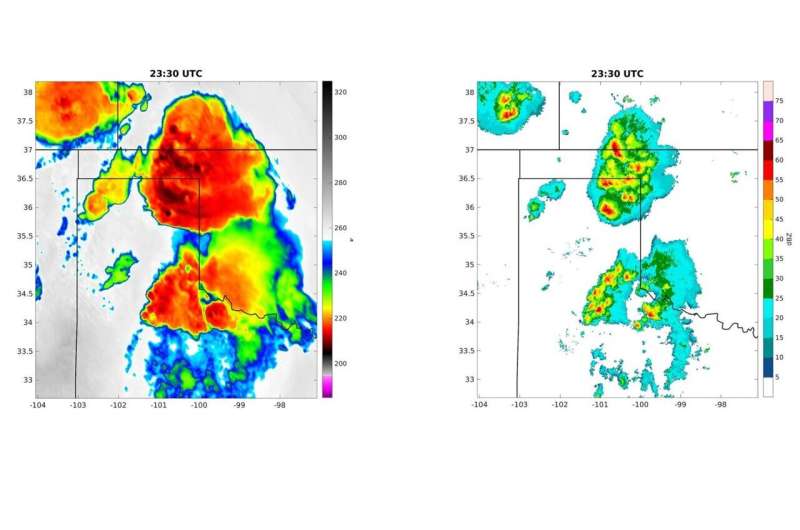
Tens of thousands of thunderstorms may rumble around the world each day, but accurately predicting the time and location where they will form remains a grand challenge of computer weather modeling. A new technique combining underused satellite and radar data in weather models may improve these predictions, according to a Penn State-led team of scientists.
“Thunderstorms are so ubiquitous it’s hard to count how many you get in Pennsylvania, or the United States or globally every day,” said Keenan Eure, doctoral student in the Department of Meteorology and Atmospheric Science at Penn State. “A lot of our challenges, even today, are figuring out how to correctly predict the time and location of the initiation of thunderstorms.”
The scientists found that by combining data from the geostationary weather satellite GOES-16 and ground-based Doppler radar they could capture a more accurate picture of initial conditions in the boundary layer, the lowest part of the atmosphere, where storms form.
“There’s value in improving thunderstorm predictions from both Doppler radar observations and satellite observations that are currently underused and we showed that not only can they be used to improve predictions but putting them together has lots of benefits,” said Eure, lead author on the study. “The sum is greater than the individual parts.”
The technique showed promise in improving forecasts of convection initiation, the conditions that spawn storms, several hours before the thunderstorms occurred in a case study from May 2018 in the Texas panhandle. The scientists reported their findings in the journal Monthly Weather Review.
“Keenan focused on using satellite observations to better define the environment in which the storms would later form, and on using radar observations to improve the low-level wind fields that eventually helped to create the storms,” said David Stensrud, professor of meteorology at Penn State and Eure’s advisor and co-author on the study. “This observation combination had not been studied previously and ended up adding significant value to the model forecasts on this day.”
The scientists used data assimilation, a statistical method that can paint the most accurate possible picture of current weather conditions in the weather model, important because even small changes in the atmosphere can lead to large discrepancies in forecasts over time.
Understanding conditions in the boundary layer is particularly important because it strongly influences the ingredients for convection—near-surface moisture, lift and instability—a process that causes warm air near the Earth’s surface to rise and form clouds.
“We obviously can’t model every molecule in the atmosphere, but we want to get as close as possible,” Eure said. We really believe this work adds a lot of valuable information that models currently don’t have and that we can help the depiction of the lowest part of the atmosphere.”
The team assimilated satellite and radar data separately and simultaneously and found the best results came from combining infrared brightness temperature observations from the satellite and radial wind velocity and boundary height observations from the radar.
The work uses all-sky satellite data assimilation, developed by Penn State’s Center for Advanced Data Assimilation and Predictability Techniques, that assimilates satellite data from all weather conditions, including cloudy and clear skies. Forecasting previously relied on clear-sky observations, due to challenges in diagnosing the complex physical processes within clouds, the scientists said.
“While more cases need to be explored, these observations are currently available and could be used to improve thunderstorm prediction over the coming decade as NOAA continues to advance its Warn-on-Forecast paradigm in which computer model predictions help to make severe weather warnings more accurate and timely,” Stensrud said.
More information:
Keenan C. Eure et al, Simultaneous Assimilation of Planetary Boundary Layer Observations from Radar and All-Sky Satellite Observations to Improve Forecasts of Convection Initiation, Monthly Weather Review (2023). DOI: 10.1175/MWR-D-22-0188.1
Provided by
Pennsylvania State University
Underused satellite, radar data may improve thunderstorm forecasts (2023, March 9)
retrieved 10 March 2023
from https://phys.org/news/2023-03-underused-satellite-radar-thunderstorm.html
part may be reproduced without the written permission. The content is provided for information purposes only.